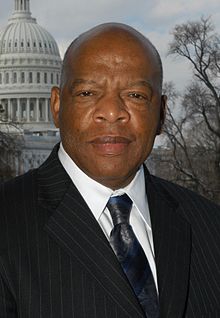Civil Rights, Politics
John Robert Lewis, (born February 21, 1940, Troy, Alabama, U.S. — died July 17, 2020, Atlanta, Georgia), American civil rights leader and politician best known for his chairmanship of the Student Nonviolent Coordinating Committee (SNCC) and for leading the march that was halted by police violence on the Edmund Pettus Bridge in Selma, Alabama, in 1965, a landmark event in the history of the civil rights movement that became known as “Bloody Sunday.” 1
Lewis left the SNCC in 1966 and continued his work to enfranchise minorities. In 1970, he became director of the Voter Education Project. During his tenure, the VEP helped to register millions of minority voters.
Lewis won a seat on the Atlanta City Council in 1981, then the House of Representatives in 1986. As a representative of Georgia’s 5th District until his death, he was one of the most respected members of Congress. He championed healthcare reform, education improvements and he oversaw multiple renewals of the Voting Rights Act. When the Supreme Court struck down part of the law in 2013 Lewis decried the decision as a “dagger into the heart” of voting rights.
>>> Read More HERE at Biography.
1Encyclopedia Brittanica
Black History, Civil Rights
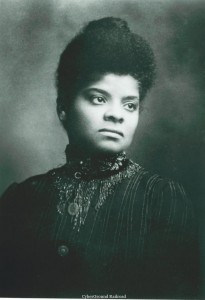
Ida B. Wells-Barnett
b.1862 – d.1931. Anti-lynching crusader, journalist, and advocate for racial justice and women’s suffrage. For Wells-Barnett, overcoming racism and halting the violent murder of black men was a central mission among her wide-ranging struggles for justice and human dignity. Born in Mississippi, she was educated at Rust University, actually a high school and industrial school. From 1884 to 1891, she taught in a rural school near Memphis and attended summer classes at Fisk University in Nashville.
A pattern of resistance to racial subordination was set early in Wells’ life. In 1887, she purchased a railroad ticket in Memphis and took a seat in the section reserved for whites. When she refused to move, she was physically thrown off the train. She successfully sued the Chesapeake and Ohio Railroad for damages. Upon appeal, however, the Supreme Court of Tennessee reversed the lower court’s ruling. (more…)
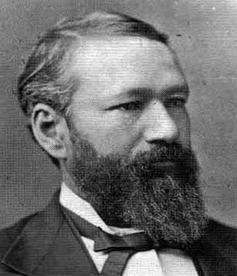
Black History, Civil Rights

Homer Plessy
Plaintiff for a landmark Supreme Court case, Homer A. Plessy was born on March 17, 1863 in New Orleans. He was a light-skinned Creole of Color during the post-reconstruction years.
With the aid of the Comité des Citoyens, a black organization in New Orleans, Homer Plessy became the plaintiff in the famous Plessy v. Ferguson case decided by the U.S. Supreme Court in May 1896. The decision established the “separate but equal” policy that made racial segregation constitutional for the next six decades.
In order to challenge the 1890 Louisiana statute requiring separate accommodations for whites and blacks, Homer Plessy and the Comité des Citoyens used Plessy’s light skin to their advantage. On June 7, 1892 Plessy bought a first class ticket on the East Louisiana Railway. (more…)
Black History, Civil Rights
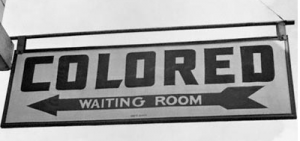 The beginning of the desegregation of the Greyhound Bus Station waiting rooms in Louisville, KY, took place in 1953 and continued with the activism of Charles Ewbank Tucker, who was a minister, a civil rights activist, and an attorney. The actual challenge began in December of 1953 when William Woodsnell took a seat in the white waiting area of the Louisville Greyhound Bus Station and refused to move. Woodsnell was arrested and charged with disorderly conduct. The next day, Charles E. Tucker, Woodsnell’s attorney, took a seat in the white waiting area of the bus station and no one approached him or asked him to move. The Louisville Greyhound Bus Station was the starting point for segregated waiting rooms for passengers heading south aboard Greyhound buses. (more…)
The beginning of the desegregation of the Greyhound Bus Station waiting rooms in Louisville, KY, took place in 1953 and continued with the activism of Charles Ewbank Tucker, who was a minister, a civil rights activist, and an attorney. The actual challenge began in December of 1953 when William Woodsnell took a seat in the white waiting area of the Louisville Greyhound Bus Station and refused to move. Woodsnell was arrested and charged with disorderly conduct. The next day, Charles E. Tucker, Woodsnell’s attorney, took a seat in the white waiting area of the bus station and no one approached him or asked him to move. The Louisville Greyhound Bus Station was the starting point for segregated waiting rooms for passengers heading south aboard Greyhound buses. (more…)
Black History, Civil Rights, Sports
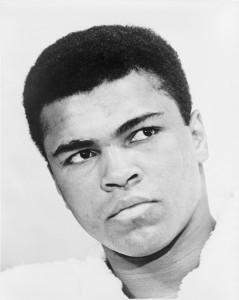
Muhammad Ali
Muhammed Ali was born Cassius Clay in Louisville, Kentucky. From 1956-60, Clay fought as an amateur (winning 100 of 108 matches) before becoming the light-heavyweight gold medalist in the 1960 Olympics. Financed by a group of Louisville businessmen, he turned professional and by 1963 had won his first 19 fights. In 1964 he won the world heavyweight championship with a stunning defeat of Sonny Liston. Immediately afterwards, Clay announced that he was a Black Muslim and had changed his name to Muhammad Ali.
In 1967, after defending the championship nine times within two years, Ali was stripped of his title for refusing induction into the U.S. Army based on religious grounds. His action earned him both respect and anger from different quarters, but he did not box for three and one-half years until, in 1971, he lost to Joe Frazier.
A few months later, the U.S. Supreme Court affirmed his right to object to military service on religious grounds and Ali regained the title in 1974 by knocking out George Foreman in Zaire, Africa. Ali defended his title 10 times before losing to Leon Spinks in 1978. When he defeated Spinks later that same year, he became the first boxer ever to regain the championship twice. (more…)
Black History, Civil Rights, Government, Politics
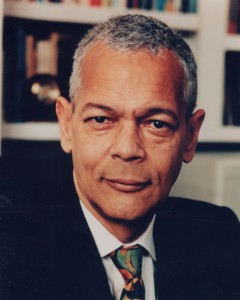
Julian Bond
HORACE JULIAN BOND (Jan. 14, 1940 – Aug. 15, 2015), U.S. legislator and black civil-rights leader, best known for his fight to take his duly elected seat in the Georgia House of Representatives. The son of prominent educators, Bond attended Morehouse College in Atlanta (B.A., 1971), where he helped found a civil-rights group and led a sit-in movement intended to desegregate Atlanta lunch counters.
In 1960 Bond joined in creating the Student Nonviolent Coordinating Committee (SNCC), and he later served as communications director for the group. In 1965 he won a seat in the Georgia state legislature, but his endorsement of a SNCC statement accusing the United States of violating international law in Vietnam prompted the legislature to refuse to admit him. (more…)
